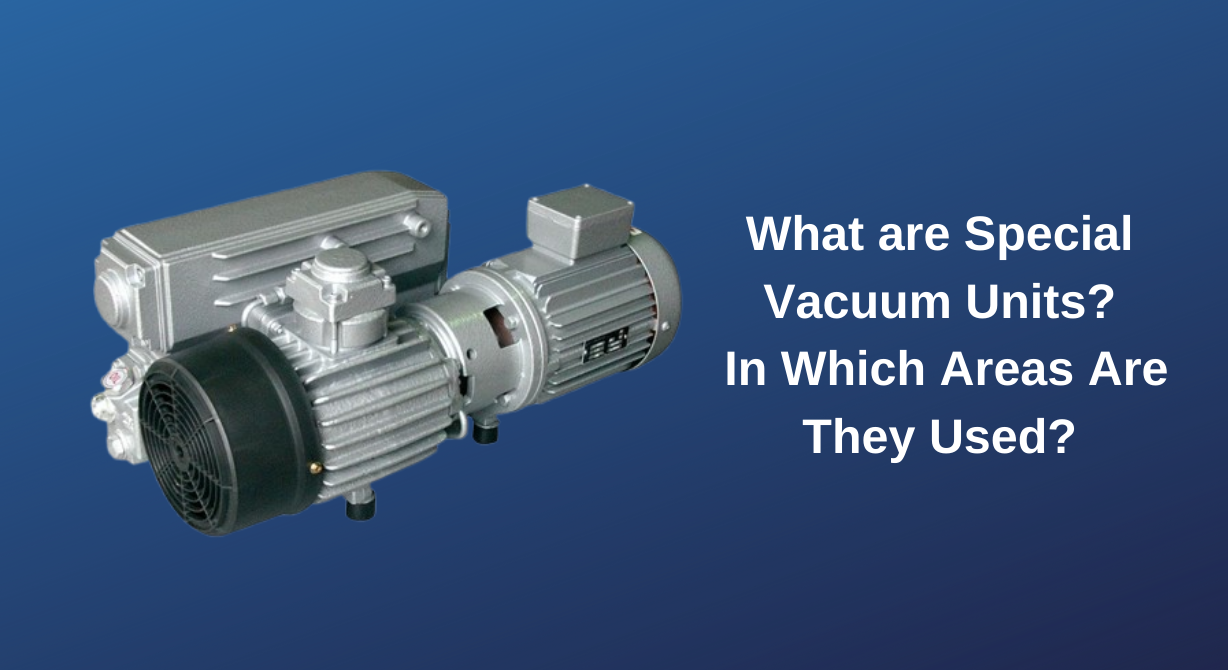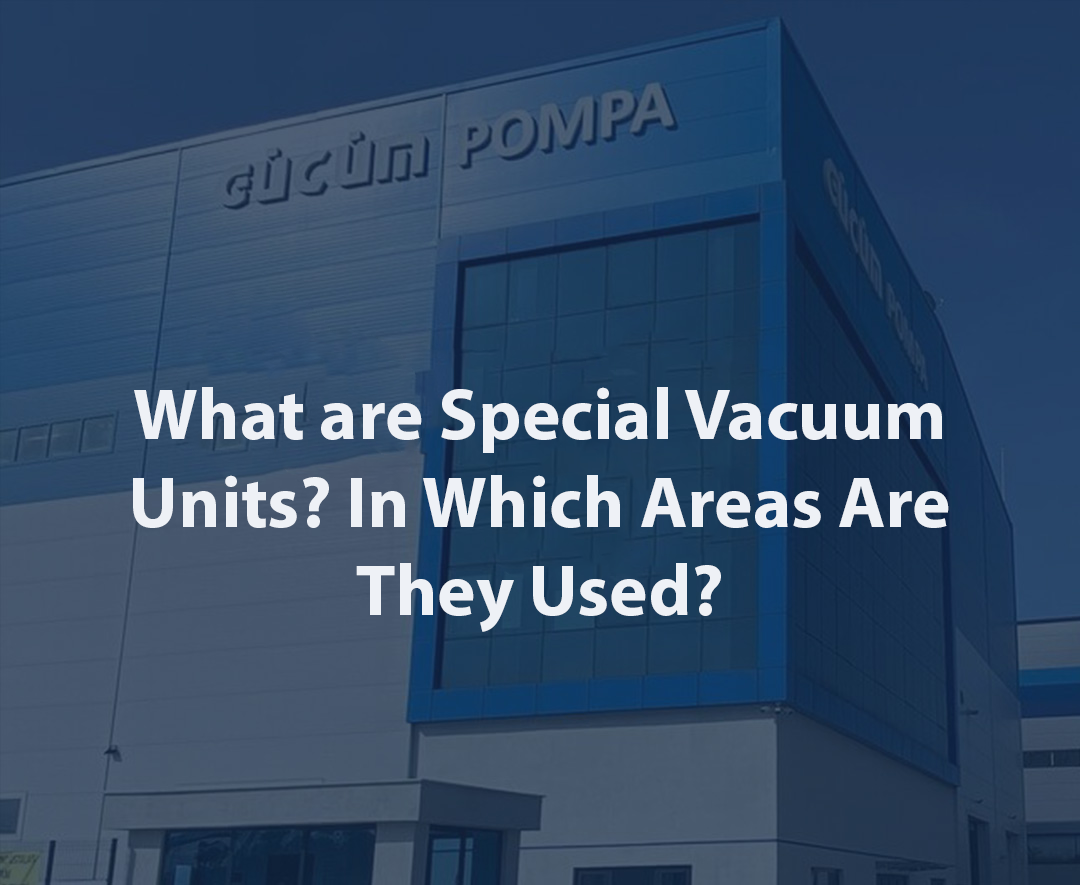What are Special Vacuum Units? In Which Areas Are They Used?
What are Special Vacuum Units?
Special Vacuum Units are custom designed vacuum systems used in industrial and commercial applications. These units can be customised according to specific job requirements and industry specifications. Vacuum technology is used in various industrial processes by creating a low pressure area in a specific environment through these special units.
These special vacuum systems are often used extensively in industrial automation, packaging, healthcare, electronics manufacturing and many other industries. Special Vacuum Units can be customised to suit the customer's needs, ensuring maximum efficiency and reliability in a given production line or work process.
Superior design and special functions make these vacuum units indispensable in industrial applications. Often incorporating features such as high performance, durability and energy efficiency, Special Vacuum Units are the ideal choice for businesses looking for a continuous and reliable vacuum solution in industrial plants.

How Do Special Vacuum Units Work?
They are specially designed vacuum systems used in industrial and commercial applications and their working principles are quite impressive and customisable. These units work by creating a low-pressure environment in a closed system through the suction of air or gas.
To create vacuum, Special Vacuum Units usually include a vacuum pump. These pumps, in combination with specially designed valves and control systems, provide vacuum levels suitable for a specific application. When the vacuum pump depressurises a given environment, it allows the surrounding air or gas to be sucked in, resulting in the creation of a low-pressure environment.
Special Vacuum Units have a wide range of applications in industrial automation, packaging, healthcare, electronics manufacturing and many other sectors. Their operating principles and technical details can often be customised to suit user needs, enabling these units to be easily integrated into various industrial processes.
What are the Technical Specifications of Special Vacuum Units?
Special vacuum systems usually have a high suction capacity, which enables the rapid suction of air or gas in a given environment. Customisable vacuum levels allow these units to be adapted to various applications.
They usually include powerful motors and high performance vacuum pumps. This is important to maintain the desired vacuum levels and adapt to specific application requirements.
Technical specifications can include features such as precision control systems, specially designed valves and integrated sensors. These features are designed to optimise vacuum levels and improve energy efficiency.
They are usually designed in accordance with industrial standards so that reliability and durability can be ensured. Factors such as material quality, impact resistance and long life expectancy form an important part of the technical specifications.
The technical specifications of Special Vacuum Units include high performance and reliable vacuum solutions that can be customised to suit the specific needs of users.
In Which Industries are Special Vacuum Units Preferred?
Special Vacuum Units offer custom designed vacuum solutions for a wide range of industrial applications. These units are preferred in a number of sectors and are used effectively especially in the following areas:
Industrial Automation: Special Vacuum Units are widely used in processes such as material handling, packaging and placement in automation systems.
Packaging Industry: In the packaging processes of food, pharmaceutical and other industrial products, vacuum technology is effectively applied through Special Vacuum Units.
Electronics Production: Efficiency and accuracy are increased by using Special Vacuum Units in precision processes such as assembly and manipulation of electronic components.
Healthcare Industry: In the production, packaging and transport of medical devices, Special Vacuum Units provide a clean and reliable solution.
Paper and Printing Industry: Special Vacuum Units are preferred for material handling and stabilisation in paper processing and printing processes.
Metal Processing: In the processes of transporting and processing metal sheets, vacuum technology is successfully applied with Special Vacuum Units.
In these sectors, Special Vacuum Units increase productivity and efficiency by offering vacuum solutions suitable for specific industry needs with their customisable design and high performance.
What is the Contribution of Special Vacuum Units to Industrial Processes?
Special Vacuum Units are special vacuum systems designed to increase efficiency, accuracy and productivity by making valuable contributions to industrial processes. These specialised units add value to a variety of industrial processes in a number of sectors.
Firstly, in industrial automation processes, Special Vacuum Units are used in processes such as material handling, placement and packaging, improving the efficiency of automated production lines. Thanks to their precise control systems, they optimise production processes by operating at high speed and accuracy.
In the packaging industry, Special Vacuum Units optimise packaging processes by helping to pack products safely and quickly. This enables products to be stored and transported more efficiently.
In electronics manufacturing processes, Special Vacuum Units offer an ideal solution for the safe transport and assembly of sensitive components. This improves the quality of electronic products and optimises production speed.
In the healthcare sector, in the production of medical devices, Special Vacuum Units offer a reliable solution by meeting hygiene standards. These units contribute to precise and clean production processes.
How to Maintain and Clean Special Vacuum Units?
Regular maintenance and cleaning of Special Vacuum Units is critical to ensure long life and consistently high performance. has a vacuum system. Maintenance of these special design vacuum systems includes the following steps:
1. Cleaning the Rotor and Vanes: The rotor and vanes inside the vacuum pump can become contaminated over time. It is important to clean the rotor and check the vanes at certain intervals. Dirty or worn vanes may need to be replaced.
2. Regular Replacement of Filters: Filters in vacuum units ensure that the air or gas entering the pump is cleaned. Clean filters help the pump to operate efficiently. Filters need to be cleaned or replaced regularly.
3. Control of Oil Levels: Vacuum pumps are usually oil based. It is important to check oil levels regularly and add oil if necessary. Correct oil levels reduce friction and ensure long life and effective operation of the pump.
4. General Control of the Vacuum System: A general check of the Special Vacuum Units includes checking the tightness of all joints, inspecting valves for proper operation, and ensuring that sensors are taking accurate readings.
5. Following the Manufacturer's Recommended Maintenance Instructions: Most important is the strict adherence to the maintenance instructions recommended by the manufacturer of the Special Vacuum Units. Each unit may be different, so follow the manufacturer's
